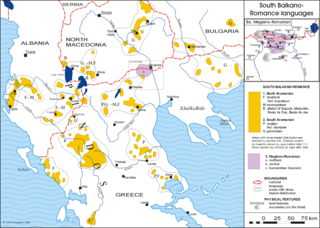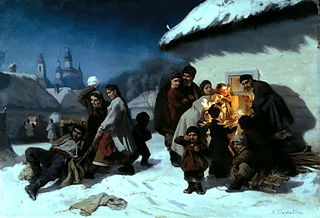
Old Church Slavonic or Old Slavonic, also known as Old Church Slavic, or Old Slavic, was the first Slavic literary language. It is also referred to as Paleo-Slavic (Paleoslavic) or Palaeo-Slavic (Palaeoslavic), not to be confused with Proto-Slavic. It is often abbreviated to OCS.
Egyptian describes something of, from, or related to Egypt.
Old Slavic or Old Slavonic may refer to:
Macedonians or Macedonian people are a nation and a South Slavic ethnic group native to the region of Macedonia. They speak the Macedonian language, a South Slavic language. About two thirds of all ethnic Macedonians live in North Macedonia and there are also communities in a number of other countries.

The South Slavic languages are one of three branches of the Slavic languages. There are approximately 30 million speakers, mainly in the Balkans. These are separated geographically from speakers of the other two Slavic branches by a belt of German, Hungarian and Romanian speakers. The first South Slavic language to be written was the variety spoken in Thessaloniki, now called Old Church Slavonic, in the ninth century. It is retained as a liturgical language in some South Slavic Orthodox churches in the form of various local Church Slavonic traditions.

The Paleo-Balkan languages are the various extinct Indo-European languages that were spoken in the Balkans in ancient times. Hellenization, Romanization and Slavicization in the region caused their only modern descendants to be Modern Greek, which is descended from Ancient Greek, and Albanian, which evolved from either Illyrian, Thracian, Dacian or another similar tongue.

Megleno-Romanian is a Balkan Romance language, similar to Aromanian or a dialect of the Romanian language. It is spoken by the Megleno-Romanians in a few villages in the Moglena region that spans the border between the Greek region of Macedonia and North Macedonia. It is also spoken by emigrants from these villages and their descendants in Romania and by a small Muslim group in Turkey. It is considered an endangered language.

The Resian dialect is a distinct dialect of Slovene spoken in the Resia Valley, Province of Udine, Italy, close to the border with Slovenia. Because of its remote location outside Slovenia, the dialect has phonetic properties different from standard Slovene, and from most other Slovene dialects. Many, arguably the majority, of its speakers consider it a separate language.

Torlakian, or Torlak, is a group of South Slavic dialects of southeastern Serbia, southern Kosovo (Prizren), northeastern North Macedonia, western Bulgaria (Belogradchik–Godech–Tran-Breznik). Torlakian, together with Bulgarian and Macedonian, falls into the Balkan Slavic linguistic area, which is part of the broader Balkan sprachbund. According to UNESCO's list of endangered languages, Torlakian is vulnerable.

The name Macedonia is used in a number of competing or overlapping meanings to describe geographical, political and historical areas, languages and peoples in a part of south-eastern Europe. It has been a major source of political controversy since the early 20th century. The situation is complicated because different ethnic groups use different terminology for the same entity, or the same terminology for different entities, with different political connotations.

The Slavic dialects of Greece are the dialects of Macedonian and Bulgarian spoken by minority groups in the regions of Macedonia and Thrace in northern Greece. Usually, these dialects are classified as Bulgarian in Thrace, while the dialects in Macedonia are classified as either Macedonian or Bulgarian. Until the official codification of the Macedonian language in 1945 many linguists considered all these to be Bulgarian dialects.
The name of the Macedonian language, as used by the people and defined in the constitution of North Macedonia, is "Macedonian". The language has been, and remains internationally recognized as Macedonian.
Macedonian dialect may refer to:

The official language of Greece is Greek, spoken by 99% of the population. In addition, a number of non-official, minority languages and some Greek dialects are spoken as well. The most common foreign languages learned by Greeks are English, German, French and Italian.
Languages of Macedonia may refer to:

Koliada or koleda is an ancient pre-Christian Slavic winter festival. It was later incorporated into Christmas.
Slavic languages of Macedonia may refer to:
This page is based on this
Wikipedia article Text is available under the
CC BY-SA 4.0 license; additional terms may apply.
Images, videos and audio are available under their respective licenses.









